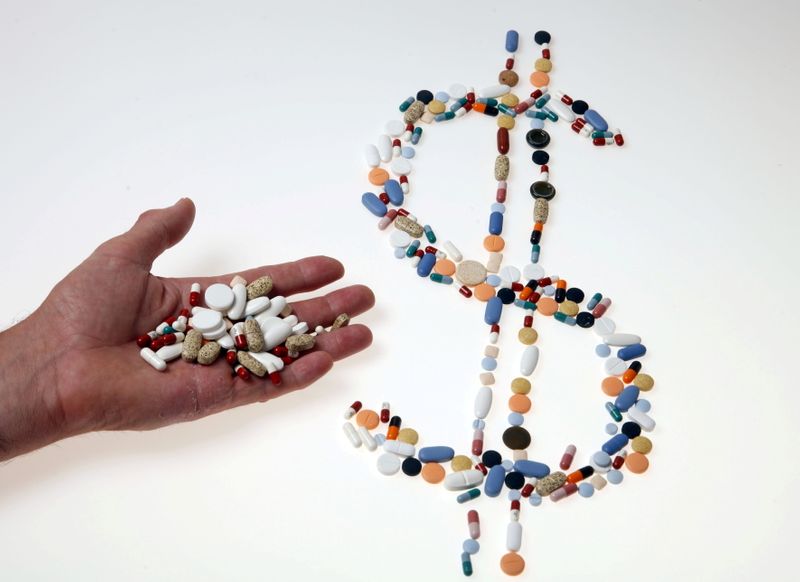By Ahmed Aboulenein and Carl O'Donnell
(Reuters) - Democratic Party lawmakers holding up proposed drug pricing reforms are among the largest beneficiaries of the pharmaceutical industry's push to stave off price cuts, a Reuters analysis of public lobbying and campaign data shows.
The industry, which traditionally gives more to Republicans, channeled around 60% of donated campaign funds to Democrats this year. It has spent over $177 million on lobbying and campaign donations in 2021.
Nonprofit political action committees (PACs) run by Pfizer Inc (NYSE:PFE) and Amgen Inc (NASDAQ:AMGN) and the Pharmaceutical Research and Manufacturers of America (PhRMA) were among the biggest donors, according to political spending data from OpenSecrets, formerly the Center for Responsive Politics.
Drugmakers are seeking to block laws that would give the U.S. government authority to negotiate prices for prescription medicines. Current U.S. law bars the government's Medicare health insurance program from negotiating drug prices directly.
Many of the Democrats opposing an ambitious drug reduction bill proposed in the House of Representatives are among some of the biggest recipients of drug manufacturer lobbying funds.
They include Senators Kyrsten Sinema of Arizona, Robert Menendez of New Jersey, and Representative Scott Peters of California, OpenSecrets data covering industry donations through September of 2021 shows. In all, they have received around $1 million in pharmaceutical and health product industry donations this year.
A spokesperson for Sinema did not respond to a request for comment on the funds she has received but said the Senator supports making drugs as cheap as possible for patients.
Menendez and Peters said the donations did not influence their views. All three said they are opposed to The Lower Drug Costs Now Act, which is sponsored by Democrats in the House of Representatives and also known as H.R.3.
Menendez and Peters have advocated for alternative scaled-back drug pricing reforms that would still allow Medicare to negotiate drug prices but would lead to significantly smaller savings.
Congressman Frank Pallone of New Jersey, who is also one of the top recipients of drugmaker donations, voted in favor of H.R.3.
Sinema, who campaigned in 2018 on cutting drug prices, told the White House she opposes allowing Medicare to negotiate them. She received about $466,000 from the industry in 2021, according to OpenSecrets data.
Peters was the top recipient of pharmaceutical industry funds in the House this year at nearly $99,550, according to OpenSecrets data. A spokesperson said Peters was not influenced by lobbying money and opposed the proposed law to protect pharmaceutical industry jobs and innovation.
Drugmakers say the Democrats’ proposed drug price overhaul would undermine their ability to develop new medicines, an argument they have used whenever price cuts are discussed by politicians regardless of political party.
"Patients face a future with less hope under Congress' current drug pricing plan," PhRMA Chief Executive Steve Ubl said in an August statement in reference to the proposed law. PhRMA declined to comment on donating to key Democratic opponents of the bill.
The United States is an outlier as most other developed nations do negotiate drug prices with manufacturers.
Amgen did not immediately respond to requests for comment on its donations and Pfizer declined to comment.
PROSPECTS FOR REFORM
President Joe Biden has vowed to cut medicine costs, in part by allowing the federal government to negotiate drug payments by Medicare, which covers Americans aged 65 and older.
But prospects for major drug pricing reforms have stalled in recent weeks amid opposition from centrist Democrats including Sinema and Peters. Negotiations are ongoing, eight Democratic staffers said.
The lawmakers' resistance comes as 83% of Americans support allowing Medicare to negotiate medicine costs, according to a Kaiser Family Foundation poll. The United States spends more than twice as much per person on drugs as other wealthy economies, about $1,500, for a total of around $350 billion in 2019.
"Members of Congress don't always mirror the views of the public and the pharmaceutical industry is a powerful lobbying force," said Larry Levitt, a health economist at Kaiser.
The healthcare industry is the second largest industry lobbying group in the United States behind the finance sector. It donated more than $600 million to politicians ahead of the 2020 elections.
The pharmaceutical industry has spent hundreds of millions of dollars per year to sway federal and state policy. But current Democratic leadership has the industry concerned major reforms could actually be enacted and is working harder to offer alternatives such as reducing insurance co-pays, one industry source said. "It's been sort of a mad scramble."
Corporations in the United States are not permitted to make direct contributions to candidates but can give money through PACs. Most corporate PACs, including Pfizer’s and Amgen’s, are run by company managers and employees.
Democrats and some drug price experts say the Lower Drug Costs Now Act could save U.S. taxpayers and consumers billions annually with relatively minor impact on innovation.
A House Oversight and Reform Committee report showed that top drugmakers have spent around $50 billion more on share buybacks and dividends than research and development between 2016 and 2020.
Lovisa Gustafsson, a healthcare policy analyst at the Commonwealth Fund, a non-profit healthcare advocacy group, said, "There are other ways that we can incentivize innovation, aside from just paying huge margins for pharmaceutical companies.”
